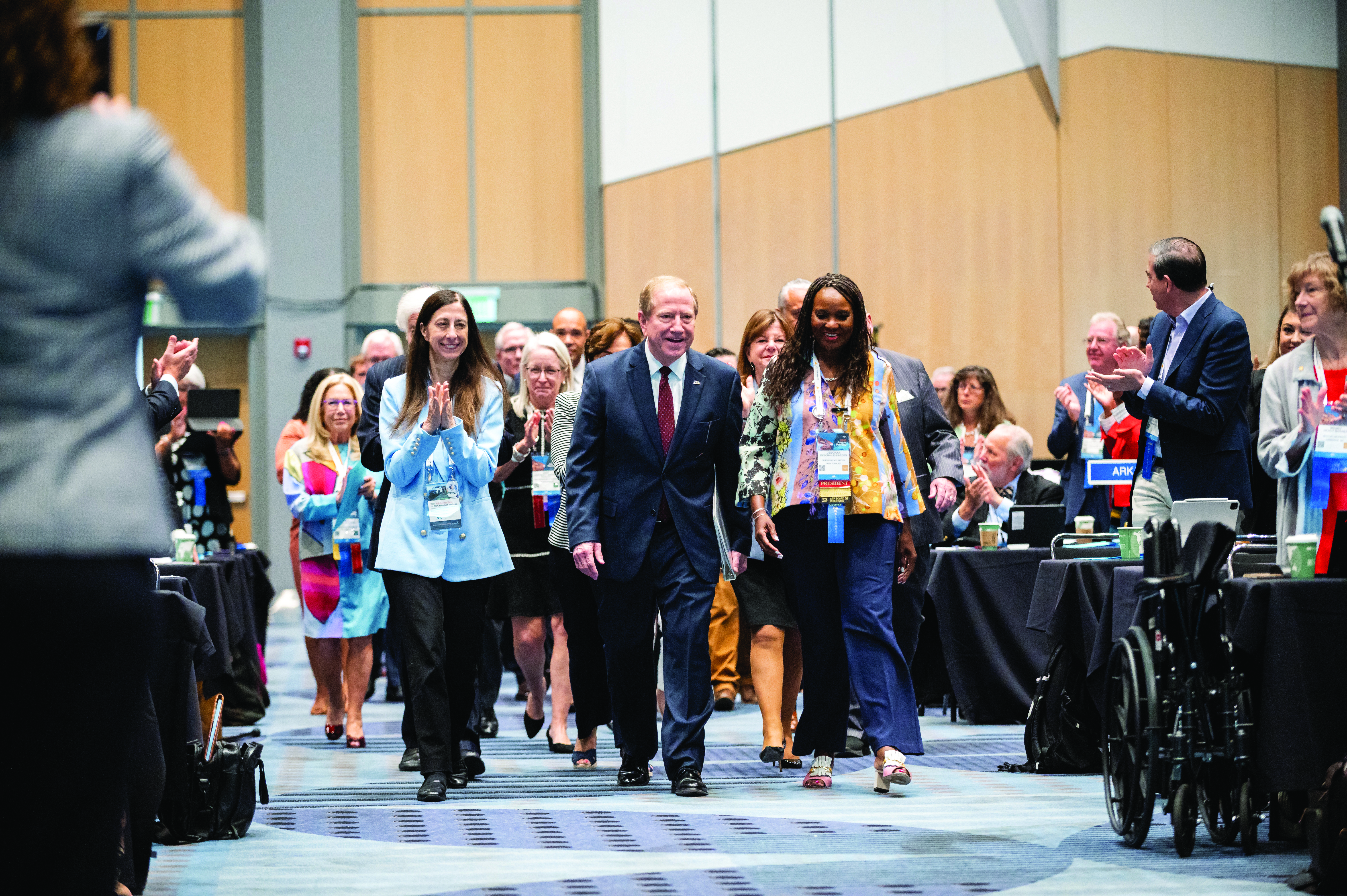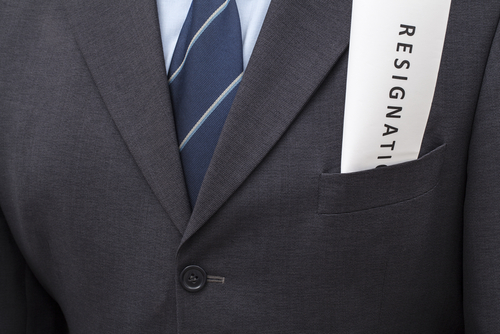New Heights: ABA leaders share visions for the association's future

ABA President Mary Smith, President-Elect Bill Bay and Immediate Past President Deborah Enix-Ross. Photo by Elevate Photography.
In her final speech as president of the ABA, Deborah Enix-Ross encouraged the House of Delegates to “keep climbing.”
“We’ve come a long way,” Enix-Ross, senior advisor to the International Dispute Resolution Group at Debevoise & Plimpton in New York City, said at the ABA Annual Meeting. “And we have so much farther to go. This is true not only with racial and ethnic equity but also for women, people in the LGBTQ+ community, people with disabilities and others who have much to contribute who’ve nevertheless been shunned or shut out of equal opportunity.”
She told House members that they must keep climbing to protect their relevance as a profession and stewardship of equal justice. This is vital, she said, to support diversity, equity and inclusion; expand access to justice through pro bono and legal aid; and promote ethics and professionalism.
Enix-Ross, who became president at the close of the 2022 annual meeting, noted some of the highlights of her journey over the past year. She traveled to Des Moines, Iowa, to visit the founding place of the National Bar Association and to Poland to address the Warsaw Bar Association, which is fighting to protect the independence of its country’s judiciary. She also gave the commencement address at her alma mater, the University of Miami School of Law.
“I hope the example I tried to set will help future lawyers climb their own mountains and lead our profession to new heights,” Enix-Ross said.
She also reflected on her signature Cornerstones of Democracy project, which focuses on civics, civility and collaboration. She said that the legal profession and rule of law are “under the spotlight as never before,” particularly as the 2023 ABA Survey of Civic Literacy found that 85% of respondents believe civility is worse now than it was 10 years ago.
In closing, Enix-Ross posed this question: Is the legal profession’s defense of liberty and pursuit of justice going uphill or downhill?
“I would argue that like all mountain treks, our journey together involves both,” Enix-Ross said. “As we go uphill, may we ascend to new heights, magnificent views and perhaps even revelation. And as we go downhill, may we return to our base camp of civics, civility and collaboration with the grace, perhaps that of a downhill skier.”
“We go uphill and downhill with grace, thanks to all of you,” she said.
‘Run toward the storm’
Incoming ABA President Mary Smith emphasized the need to unflinchingly face challenges to democracy in her address to the House of Delegates.
“To be blunt, the very core of our society—our commitment to democracy—is under threat,” she said. “It seems every day, assaults on the Constitution and the rule of law attack the very legitimacy of the instruments of our law and democracy.”
Smith, a member of the Cherokee Nation and the first Native American woman to lead the ABA, was presented with a handwoven ceremonial blanket by Kevin Meeks, deputy secretary of health for the Chickasaw Nation, in gratitude “for all you have done and all you will do.”
Along with calling for a commitment to shared ideals among ABA members, Smith highlighted three initiatives for her term, which has the theme “Lifting Our Voices, Charting the Future.”
First, an ABA Task Force for American Democracy will “consider and propose solutions for educating our citizens on the importance of an inclusive, strong and enduring democracy and help to provide bulwarks to bolster our democracy as conceived,” she said.
Also, a new artificial intelligence task force will look at how AI could impact “the practice of law, access to justice, and laws and regulations,” and “help ensure that the creation and incorporation of AI is done in accordance with the law.”
“Democracy is also being threatened and challenged by technology, particularly the development of generative AI,” she said. “Not only will democracy be challenged, however—but frankly, all aspects of society.”
Additionally, she emphasized the need for diversity in the legal profession. “Law touches everything in society. It’s essential that there be diversity in all its dimensions,” she said.
Smith saluted ABA members and called for them to persevere. “I see a rich blanket woven with patterns of your collective lives’ work of unwavering dedication to the defense of liberty and the pursuit of justice,” she said. “This is the North Star that has guided us and by which we will continue to steer our course.”
Saying collective commitment and active participation are the foundation of the ABA’s strength, Smith challenged the membership to “meet the moment.”
“We are called on to run toward the storm,” she said. “There is no more critical time to be a member of the American Bar Association.”
‘We have to be different’
Bill Bay, president-elect of the American Bar Association, called upon members to break down silos within the organization and join together as they recommit to improving the legal profession. “If we want to make a difference, we have to be different,” said Bay, a partner with Thompson Coburn in St. Louis. “We must put aside any differences we have and remember our continuing mission.”
To do so, he outlined a plan that includes changing the association’s dues structure; welcoming all lawyers; expanding service opportunities; unifying messaging; and developing leaders.
“If we do not agree to work together as one ABA, we will not find success,” he said.
Bay suggested the creation of a new price structure for members, eliminating additional dues for memberships to specific sections.
“There must be one price for access to everything the association offers,” he said. “It’s irritating to a new member who pays dues to become a member and then finds they have to pay additional dues to another entity within our association to get access to content.”
Bay, a former chair of the House of Delegates, underscored the need to welcome all lawyers.
“The world is a place where people with different views will not even sit in the same room,” he said. “We cannot be like that.”
New members should have immediate access to service opportunities, he said. Additionally, the ABA must focus on developing leaders within the organization specifically and in the legal profession generally.
“We lead with our voice—we need to lead with our actions,” said Bay, who initially joined the ABA as a member of the Young Lawyers Division in the 1980s. “Young lawyers are not part of our future. They are integral parts of our association now, and everything we do must reflect that.”
He acknowledged that the changes he envisions will not be easy.
“There will not be 100% clarity. There will be risk,” he said. “We are going to make mistakes, but we are going to learn from them quickly and evolve. But to be faithful to our mission, to the reason we exist, we must act quickly and decisively.”
Bay, who was elected to the position of incoming president-elect at this meeting, will succeed Smith. He will serve as ABA president for the 2024-2025 term, which will begin at the close of the 2024 ABA Annual Meeting in Chicago.
This story was originally published in the October-November 2023 issue of the ABA Journal under the headline: “New Heights: ABA leaders share visions for the association’s future.”
Write a letter to the editor, share a story tip or update, or report an error.



